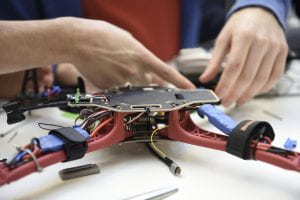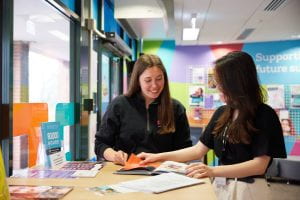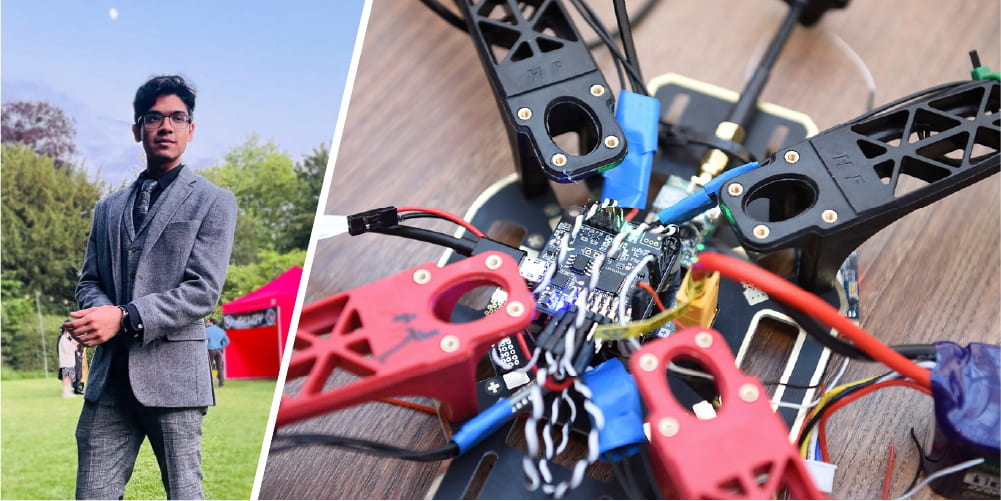Considering the MSc in Aerial Robotics?
We asked recent graduate, Adil Shaikh, to tell us about his experience and how it led him to secure his dream job.
When did you study and what are you doing now?

I completed an MSc in Aerial Robotics which led me to my current career as a “Computer Vision Engineer” at DeGould. A Computer Vision Engineer is somebody who designs computers that can see and interact with the world using cameras, AI and other sensors.
My role involves developing and implementing
computer vision algorithms to analyse and interpret visual data, often from automotive inspections. I use sensors like cameras, encoders and Lidars to get the
3D location of defects on cars, including where they are and how big they are.
DeGould carries out quality management for all the major car manufacturers in the UK, which is an exciting prospect for me. Some of the projects that I work on involve detecting 3D defects in cars and locating them physically. I also work with technology to give humans the ability to see and work on solutions for these defects using AR (augmented reality).
How has the course content helped you in your current job?
Skills in machine learning, image processing, and robotics are key features of the MSc programme that I use regularly in my job. The course helped me get a comprehensive understanding of robotic systems and a unique perspective on automation and control systems.
As part of the MSc, I worked on developing a drone navigation system using computer vision to traverse around an active volcano for collecting the necessary research samples. This project required integrating hardware and software components in ROS (Robot Operating System) and provided invaluable experience in system design and troubleshooting, which are crucial in my current job.
These skills helped me secure my role at DeGould including:
- A proficiency in programming languages like Python
- Expertise and experience in computer vision libraries (such as OpenCV)
- A strong foundation in machine learning algorithms.
I also developed incredibly important workplace skills such as communication and teamwork through collaborating on diverse team projects.
Why did you choose Bristol for the course?
I chose the University of Bristol because as an aspiring roboticist, I knew the University has the latest and state-of-the-art facilities like the Bristol Robotics Laboratory (BRL). The reputation of the BRL was a significant factor in choosing Bristol. Its cutting-edge research and collaborative environment were highly appealing.
As someone from India heading to Bristol to study, this city is quite diverse. It has a part historic and part modern-cool vibe. In Bristol, it feels like the world’s come together. You’ll find people from all corners, and guess what, they celebrate Diwali and Holi too. It’s like a little piece of India in the UK, making you feel less homesick. You meet folks from everywhere, and that’s awesome for making friends from around the globe. Plus, you get to share your story and hear theirs – it’s a cultural exchange. For times when you need a break from studies, there are loads of parks and other places to hang out. And the food! You’ll find some decent Indian food when you’re missing home cooking, plus a bunch of other cuisines to try.
What part of the programme stood out for you?

The group project mimicked a real-life scenario that one would encounter in a professional setting. The project was for us to build a service through automation using the latest techniques employed in the industry. The approach was very comprehensive and taught us about logistics and safety aspects as well as the tech part. We learned how to design and plan a campaign and that made it an easy product for everyone involved.
My team involved people with varied academic backgrounds, and everybody brought their own set of skills and perspectives to the project. The primary challenge was bringing these skills together to achieve a common goal. For example, combining expertise in software engineering, environmental science, and product management was critical to developing an effective aerial system. Each team member’s input was vital, from conceptualisation to execution. We also needed to apply an academic approach to problem-solving and innovation.
What advice would you give students looking for a career after studying?
Careers Service

Supporting students before and after graduation
with resources including dedicated workshops and
courses, employer research, growing a network
and personal guidance on career options.
You always start by preparing for the “tell me about yourself” question. Remember, the first impression is the last impression.
From a more academic perspective, I would suggest going back to the basics. You should read about image processing and machine learning concepts, and know enough details about all the things you mention in your resume.
Do not forget to practice and improve your coding ability while you are preparing or waiting for a decision.
Would you recommend MSc Aerial Robotics to future students?
I would highly recommend the MSc Aerial Robotics course at the University of Bristol! It offers a blend of theoretical knowledge and practical skills, preparing students for careers in fields like robotics, aerospace, and computer vision. The course’s emphasis on real-world applications and hands-on experience is invaluable. After graduating, I explored various career options, including roles in drone technology development, robotics engineering, and, ultimately, as a Computer Vision Engineer, which aligned best with my interests and skills.
Useful links
- Learn more about MSc Aerial Robotics
- More on the Career Service offered at the University of Bristol
*The course information and statements contained within this blog are correct at time of publication.


